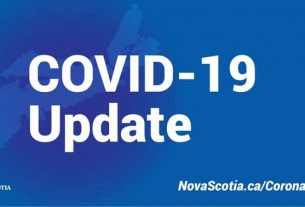**** HEALTH/WELLNESS Media Release
52 New Cases of COVID-19, 19 Recoveries
—————————————————————-
NOTE: Due to technical issues, immunization data is not included in today’s release or on the COVID-19 data dashboard. Immunization data will be updated Friday, December 10.
—————————————————————-
Today, December 9, Nova Scotia is reporting 52 new cases of COVID-19 and 19 recoveries.
There are 29 cases in Central Zone, 18 cases in Eastern Zone, three cases in Northern Zone and two cases in Western Zone. There is a cluster of cases in a localized community in Northern Zone and there is also evidence of limited community spread in Halifax and parts of northern Nova Scotia.
There are 38 new cases being reported today, and 59 in total so far, related to the outbreak at St. Francis Xavier University in Antigonish. So far, those infected are experiencing very mild symptoms because the cases are mostly young people who are fully vaccinated. We expect more new cases in the coming days. The university reports that about 95 per cent of the student body is vaccinated.
There has been no evidence of spread in classrooms or residences to date, and no secondary transmission in the community. Currently, the investigation has found the majority of spread happened in smaller, private gatherings. Most cases are related to those who attended activities December 2-5, both on and off campus. There is an ongoing enforcement investigation.
The university, students and community have been very cooperative and are complying with public health investigation advice, including testing. To help with finding cases, Nova Scotia Health’s testing centre has increased its hours of operation, the Public Health Mobile Unit will be in the community over the next several days and take-home test kits are being distributed by Nova Scotia Health and the university.
“Our priority right now is supporting those who are positive and containing any further spread on campus and in the community,” said Dr. Robert Strang, Nova Scotia’s Chief Medical Officer of Health. “The vaccine is doing its job by limiting spread and keeping symptoms mild, so this outbreak is very different from what we’ve seen in previous wave 4 outbreaks. Our concern level is lower because of wide-spread vaccinations and the symptoms we are seeing. It is important that community members and students diligently practice public health measures, especially masking and isolation if need be, and get tested if they have symptoms and attended any of the activities or had interactions with the people involved. A thank you to the people who have quickly come forward to be tested.”
On December 8, four schools were notified of an exposure(s) at the school. As always, all staff, parents and guardians are notified of exposures if a positive case (student, teacher or staff) was at the school while infectious. A list of schools with exposures is available online: https://backtoschool.ednet.ns.ca/school-exposures .
As of today, Nova Scotia has 194 active cases of COVID-19. Of those, nine people are in hospital, including four in ICU.
On December 8, Nova Scotia Health Authority’s labs completed 4,454 tests.
Since August 1, there have been 2,636 positive COVID-19 cases and 16 deaths. Cases range in age from under 10 to over 90. There are 2,426 resolved cases. Cumulative cases may change as data is updated in Panorama.
Testing advice:
Nova Scotians with or without symptoms can book a test at: https://covid-self-assessment.novascotia.ca/en for COVID-19 for COVID-19 testing centres across the province. Those eligible to receive asymptomatic testing are listed at: https://www.nshealth.ca/visit-covid-19-testing-site . Those with no symptoms who do not meet the criteria are encouraged to use one of the rapid testing pop-up sites if they want to be tested. Some public health mobile unit clinics also offer drop-in testing; this will be noted in promotions.
Anyone with COVID-19 symptoms is advised to self-isolate and book a COVID-19 test.
Anyone advised by public health that they were a close contact needs to complete a full 14-day quarantine, regardless of test results, unless they are fully vaccinated. If they are fully vaccinated at least 14 days before the exposure date, they do not need to self-isolate as long as they are not experiencing any COVID-19 symptoms. They should still get tested and should monitor for symptoms up to 14 days after the exposure date. If symptoms develop, they should get tested and self-isolate until they receive a negative test result.
Symptoms and self-assessment:
Nova Scotians should visit https://covid-self-assessment.novascotia.ca/ to do a self-assessment if in the past 48 hours they have had or are currently experiencing:
— cough (new or worsening)
Or two or more of the following symptoms:
— fever (chills, sweats)
— headache
— runny nose or nasal congestion
— sore throat
— shortness of breath or difficulty breathing
People should call 811 if they cannot access the online self-assessment or wish to speak with a nurse about their symptoms.
Anyone with symptoms should immediately self-isolate and book a test.
Quick Facts:
— a state of emergency was declared under the Emergency Management Act on March 22, 2020, and has been extended to December 12, 2021
Additional Resources:
Nova Scotians can find accurate, up-to-date information, handwashing posters and fact sheets at: https://novascotia.ca/coronavirus
More information on COVID-19 case data, testing and vaccines is available at: https://novascotia.ca/coronavirus/data/
More information about public health text notifications of positive COVID-19 cases and close contacts is available here: https://www.nshealth.ca/news/public-health-begins-contacting-positive-covid-19-cases-close-contacts-text-message
Government of Canada: https://canada.ca/coronavirus or 1-833-784-4397 (toll-free)




